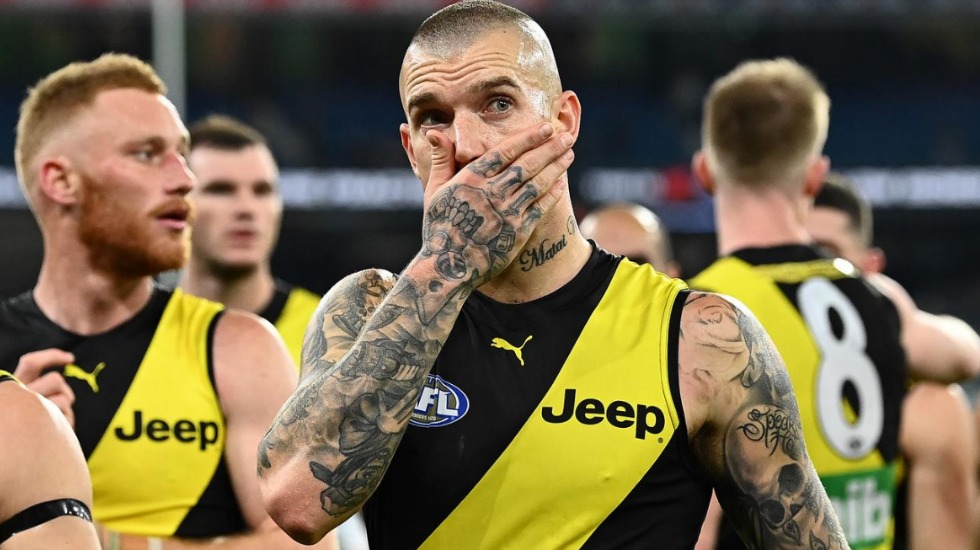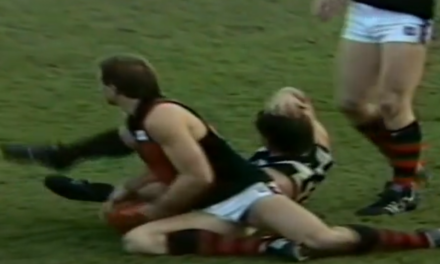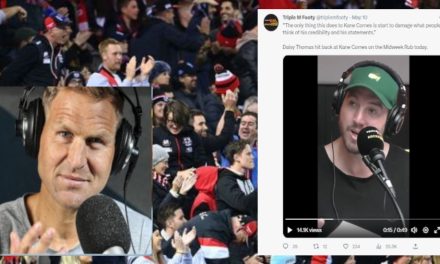Richmond champion Dustin Martin’s 2021 season came to an abrupt end when he injured his kidney in round 18. Photo: GETTY IMAGES
Football is just a game. Ultimately, we know it to be true. But that doesn’t mean we don’t wear the empathetic bumps and bruises, and grieve the losses.
For Richmond, 2021 was a shock to the system. After four years of dominance where basically everything went right (bar one fateful night in September 2018), the Tigers recorded the lowest finish ever by a reigning premier, and were the worst performed team in the league from round 13 onwards.
There was confusion, disavowal, frustration, and even sporadic optimism. Indeed, with what seemed like a generous run home, most good judges refused to write the Richmond juggernaut off until it was practically done for them by the mathematics.
But fundamentally, season 2021 for Tigers fans was one long, drawn-out process of grief. Months of frustration, culminating finally in melancholy – but satisfied – acceptance.
Today at Footyology, we present: Kubler-Ross’s Five Stages Of Grief, as experienced by the Richmond Football Club and its followers.
Denial
Looking back now, the whole season was laced with denial. It was easy to come up with reasons why Richmond wasn’t performing, and even easier to build a case for why these reasons would subside.
Undoubtedly injuries were a big part of the story, with large concentrations of absences first in the midfield, and then in the backline, meaning that depth was tested like never before. But did this narrative allow the Richmond faithful to deny the reality of what was occurring?
Certainly, suspicions were heightened in the now-fateful round 15 match against St Kilda. Coming off a bye which was sure to replenish and reinvigorate the starting 22, the Tigers had a classic dirty night, kicking a miserable two goals for the entire match.
To make matters worse, Noah Balta and Nathan Broad, two of few who had played their best footy in 2021, were struck down with syndesmosis injuries and not seen again. Concerning though it was, denial was still the theme. Rather than recognise circumstances for what they are, it’s much easier to take a “this isn’t happening” approach. To fantasise about what will happen, rather than what has. Surely Richmond would bounce back next week, make amends, and brutalise the lowly Suns?
Anger
They did not bounce back against the lowly Suns. From the moment that the ever-reliable Bachar Houli turned over his third ball of the first quarter, it was evident that all of the issues that had plagued the side a week earlier were still present.
This was not going to be a flick-of-the-switch situation, but rather a grind – a slow, arduous burn. After four years at the top of the tree, were the Tigers actually up for this? To cap off what was probably Richmond’s most maddening night at the footy since the aforementioned Mason Cox Experience, Houli decided to join his fellow defenders in injuring his syndesmosis.
Tragically, he would retire without gracing the field again. If this loss wasn’t infuriating enough (and it was), the following week the Tigers gave up a five-goal lead against arch enemy and bottom-four side Collingwood. No result could get the blood boiling more furiously. Anger in grieving is multi-faceted: there is anger with the situation, but also anger with the object of the grieving.
Anyone who was brave enough to prowl Richmond-adjacent social media that evening would have seen a lot of rage directed at the club for the first time in years. The tide was shifting.
PLEASE HELP US CONTINUE TO THRIVE BY BECOMING AN OFFICIAL FOOTYOLOGY PATRON. JUST CLICK THIS LINK.
Bargaining
A flicker of hope. The following week, Richmond rallied for Jack Riewoldt’s 300th game, and recorded a famous win against Brisbane. At a pinch, you could make the case again. The turnover game was up and running. They were even winning clearances. Toby Nankervis was back. In fact, how did anyone ever expect them to perform well without him in the side?
Injuries meant that the line-up in the Collingwood game was all kids and fringe types, they were never going to win that. The troops were slowly returning, but ultimately, it was going to be too late. At the bargaining stage of grief, two key phrases infest the spirit – “what if?” and “if only.”
In hindsight, it was all settled before the win against the Lions. But what if they hadn’t had all those injuries? What if they could just pick off some easy wins to end the season? If only they’d pinched one or two close games, like against Port Adelaide in round four, or the heartbreaker against the Eagles leading into the bye.
There’s an element of guilt associated here, too. Should more fans have turned up to Docklands? Did it matter? Is there anything more that the players, coaches or football staff could have done?
Depression
It all went to hell in a handbasket the following week against Geelong. Despite a strong performance the week before, the feeling among Richmond fans was that the Cats were out of their weight division – the latest in a long line of depressing notions, considered for the first time since 2016.
By half-time, the message was clear, and it was a message of despair and vulnerability. Even if they snuck into the final eight, there was no way they could overcome the likes of Geelong. The depression continued a week later when the team gave up a last-quarter lead against fellow finals aspirant Fremantle.
A brief respite came with a comeback victory over North Melbourne, but the fact remained that the Tigers had found themselves 26 points down against the wooden spooners, and only a Riewoldt goal on the half-time siren obviated a disastrous one-goal opening half for the third consecutive week.
Acceptance
Kubler-Ross describes the final stage of grieving as acceptance that what you had has gone, acceptance that the process of grieving is coming to an end, and acceptance that things are going to be different from now on.
The round 22 match between Richmond and Greater Western Sydney was one of the biggest of the season – effectively an early elimination final. By quarter time, the Toby Greene-less Giants led seven goals to two. By halfway through the second quarter, as Tim Taranto’s fourth goal put GWS 55 points ahead, Richmond fans all around the world sighed a collective sigh of acceptance.
There was to be no top eight. No famous, barnstorming finals series. And certainly no three-peat. The following week against Hawthorn, supporters reported that it was the most relaxed they’d been watching their team in years. Accepting the fate that had been staring the footy world in the face for months, the Tiger Army could finally readjust, and learn to live with their new reality.
And, somewhat tantalisingly, the final five minutes of that absurd draw showed that the sun was coming up, and it wasn’t all so bad after all.












Gee if you are going to copy a segment from the Big footy Tigercast at least give a little credit
Hey Belinda, if the Tigercast has come up with a similar concept, I guess it just goes to show how relevant the comparison was for Richmond fans like us. I can assure you there’s nothing more too it than that. I’m sure the Tigercast is awesome, but I haven’t been tuning in. Cheers